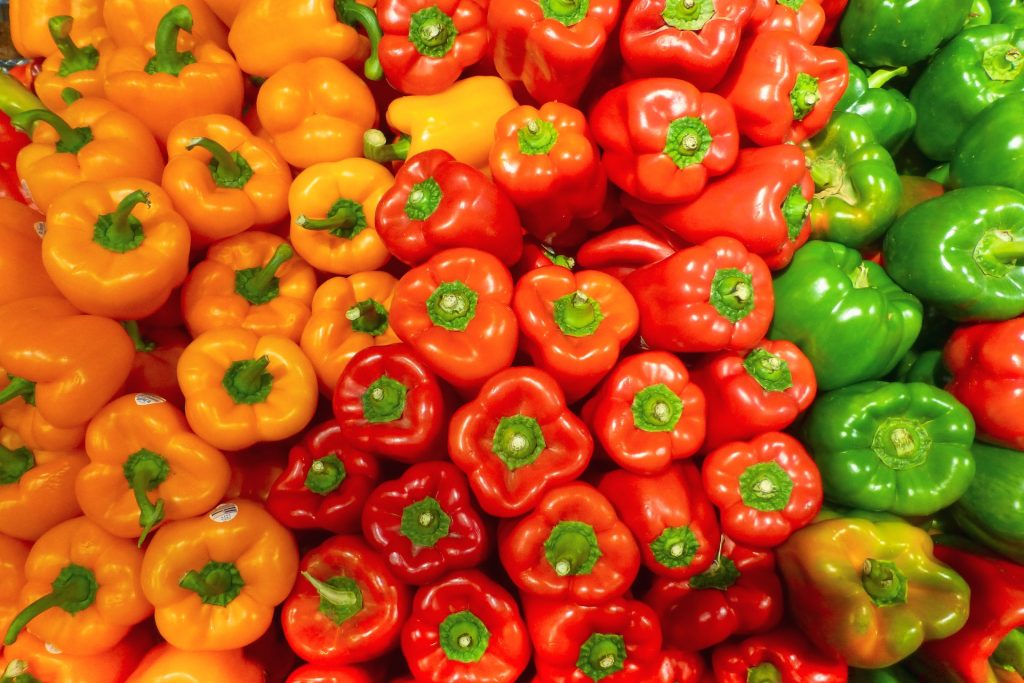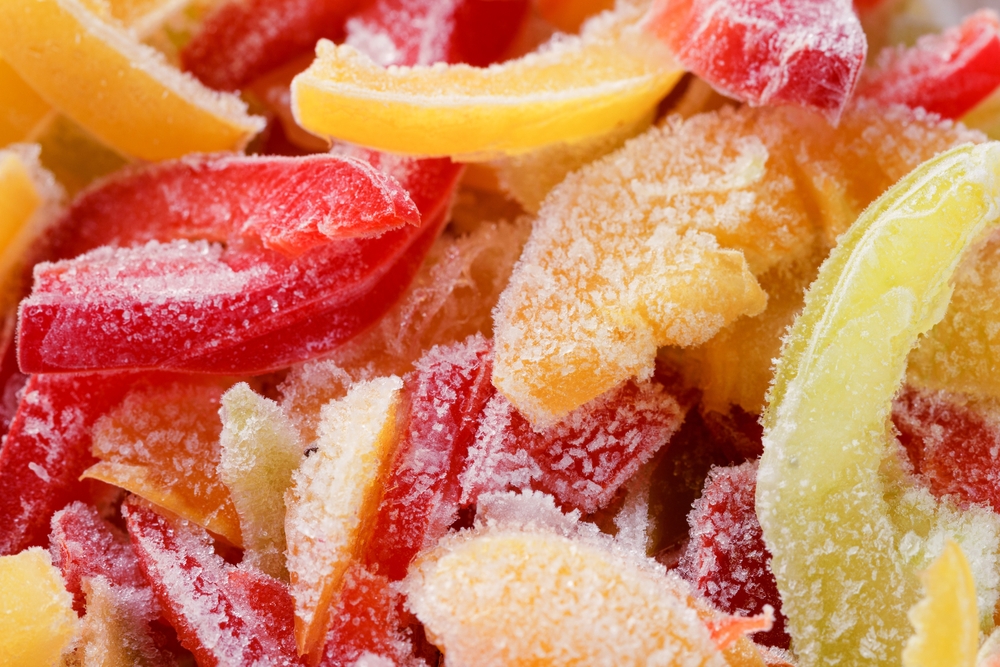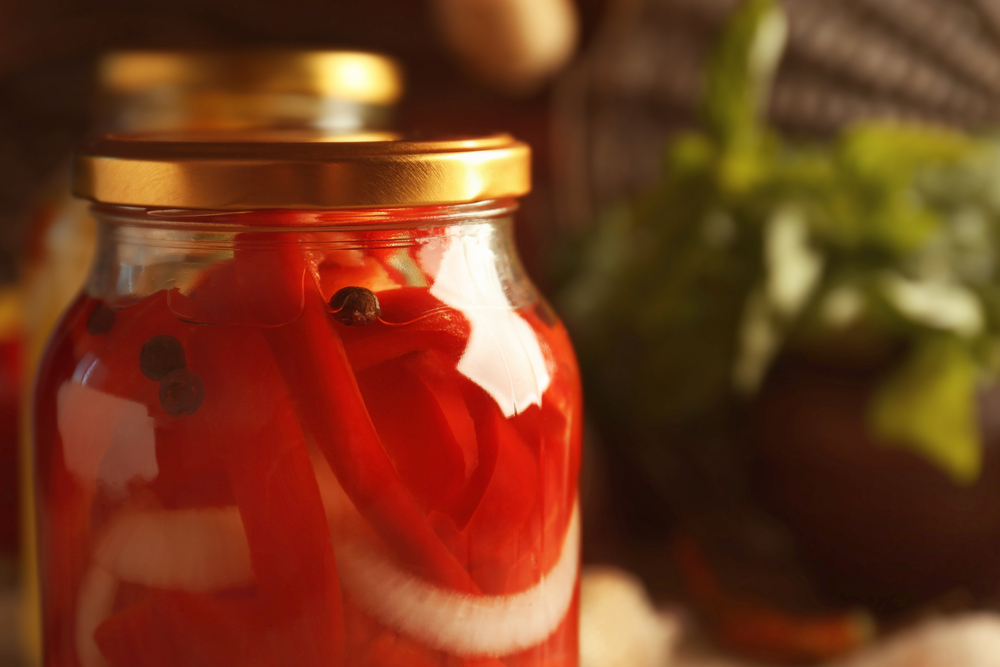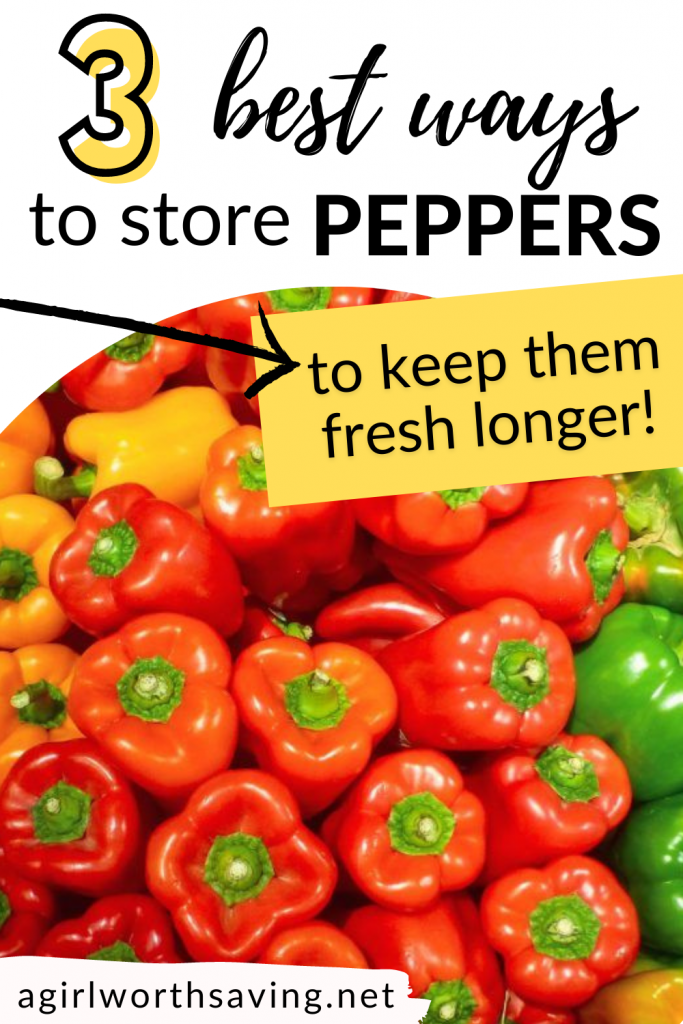This post contains affiliate links. Click here to read my affiliate policy.
Last Updated on September 1, 2023

Do you know that satisfying moment when you cut through a ripe bell pepper and hear the perfect crunch as the knife goes through? But, conversely, we all know how cutting through a shriveled pepper can be bothersome as water floods out of the vegetable, and you’re left with sad-looking slices.
If you’re wondering about how you can get that perfect crunch you wholly deserve, you’ve come to the right place! After reading this article, you’ll know all about storing different types of peppers, and you’ll be back to making your fresh and delicious recipes in no time! Here’s how to store peppers.
Different Ways to Store Peppers
There are many ways you can store peppers, according to your preference and the time you have on your hands. For instance, you can either dry them or freeze them. But if you’re busy, it might be better to pre-cook them.
Freezing

Freezing is one of the easiest ways to store peppers. Peppers can live in the freezer for up to weeks without fading or getting moldy. All you have to do is remove the seeds and stem, then cut the peppers in half or strips. Next, put the strips on a baking sheet, and make sure they aren’t touching each other.
Afterward, put the tray as it is in the freezer for about half an hour to get the peppers all solid and ready for storing. Then, pack the peppers into a plastic bag, and keep them in the freezer when the time is up.
Pro Tip: Keep a written label on any container in the freezer because they might be hard to recognize later.
Drying
If you don’t have enough space in your freezer, the better option might be to dry your peppers. However, when it comes to bell peppers, you’ll need to cut them up before storing them. On the other hand, smaller ones like chili peppers can be kept whole.
Owning a dehydrator will come in handy during this step, but it’s okay if you don’t have one. You can use your oven instead. Just put your peppers on the lowest setting and wait for them to dry entirely. Note that it might take several hours, especially for thick peppers. Once dehydrated you can see how many ounces are in a cup of peppers.
Canning

Canning is an alternative method for preserving peppers for the longest time, and it’s relatively easy. They don’t even need to be pickled. If you’re dealing with bell peppers, you need a pressure canner and some ingredients:
- Tomato juice
- Extra light olive oil
- Granulated sugar
- Sea salt
- White vinegar
To make an exceptionally good sauce, combine the ingredients without the peppers. To do so, put them in a large pot and leave them to boil. Once they begin to boil, adjust the heat to a low setting and let them simmer for nearly ten minutes. Next, put in the peppers and leave them to cook for 25 minutes with an occasional stir.
After the cooking part is over, use a pressure canner to process the peppers. Then, you’ll have yourself perfectly delicious pepper to store for up to five years.
Peppers’ Hall of Fame
The first thing you should know about storing peppers is that it’s different for each type. You can’t assume that bell peppers and hot peppers are the same. The same goes for chopped peppers and whole peppers. It’s a whole new world that you’re about to get introduced to!
Bell Peppers
Raw Bell Peppers
We all know how bell peppers are a must in any healthy diet. But we also know how quickly they wilt and give up on life. So to keep your peppers alive for a longer time, keep them in the crisper drawer.
They’ll last for a couple of weeks if you make sure they’re stored dry. Wet bell peppers are more prone to become moldy and soft.
Partially-Eaten Peppers
Since bell peppers are relatively big, you may not want to eat a whole one on your own. However, this leaves you with half a vegetable that needs to be stored properly. In general, chopped bell peppers live longer if you store them in a sealed storage container. For the best outcome, keep the stems and seeds attached.
Cut Bell Peppers
If you’ve chopped peppers but used only half the amount, you can store them in a plastic bag or an airtight container with a paper towel. The paper towel will absorb the excess moisture keeping the sliced peppers fresh for a longer time.
Finally, keep the container in your crisper vegetable drawer and enjoy the longer shelf life of your cut peppers.
Cooked Bell Peppers
Since cooking takes quite a time, and most people are busy, the solution of pre-cooking to save time came as a knight in shining armor. If you like to store your bell peppers pre-cooked, we’ve got you. Firstly, cook them only partially with a bit of oil.
When you’re done, put them on a baking sheet, and push them in the freezer for about an hour. Afterward, store them in a vacuum sealer and put them in the refrigerator. This way, you’ll be able to enjoy half-cooked peppers for almost six months.
Hot Peppers
Since hot peppers are full of moisture, you shouldn’t rinse them before storing them. Instead, just wipe them thoroughly and brush off any dirt, then store them in a produce bin if your refrigerator has one. If it doesn’t, you can easily purchase one. This way, peppers can last for up to three weeks.
However, make sure to wear gloves when you’re handling them because they contain volatile oils that can burn your skin.
Frequently Asked Questions
Can You Store Bell Peppers at Room Temperature?
Storing peppers at room temperature is possible but definitely not recommended. It’ll cause your veggies to become moldy and bitter in a shorter time.
However, if you don’t have enough space in your refrigerator, you can store them in a dry and cool place. Make sure it’s free of moisture because it causes quick rotting of bell peppers. It’ll also be best if you store them in a produce bag.
Does Storing Green Bell Peppers Differ From Storing Red and Yellow Peppers?
As a known fact, yellow and red peppers are more mature; that’s why they’re sweeter than green ones. When it comes to storing, the only difference is that the green peppers stay fresh longer.
What Is the Difference Between Storing Bell Peppers and Sweet Peppers?
Bell peppers are just a type among the many types of sweet peppers. Sweet ones also include many pepper types with sweet, fruity, and hot flavors. Accordingly, you can store them in any way you see suitable.
How Long Do Bell Peppers Last?
This depends on how you store your bell peppers. Frozen peppers will stay with you for up to six months, but dried ones will only survive for a couple of weeks. For the longest preservation period possible, try canning. It’ll keep your peppers fresh for years.
How Do You Know When Your Bell Peppers Have Gone Bad?
There are a few signs you can detect that’ll show you that your bell peppers are no longer usable. For instance, if you notice any mold or black spots on the veggies, it’s time to toss them out. Moreover, the appearance of wrinkles on their surfaces means they’ve lost moisture, which means they’ll be slimy in no time.
To Wrap Up
Peppers are colorful and delicious, but they don’t last long. Luckily, you can delay their expiration date for a bit with a few tips. First of all, you can push them in the freezer and let them live for months. If you don’t have enough space, you can try drying or canning them. The possibilities are endless, aren’t they?
No matter what method you choose to try, you’ll enjoy fresh peppers for your recipes for a long time. Now that you have enough answers about the topic, you can brag about it to your friends!
Read More Food Tips Here:


